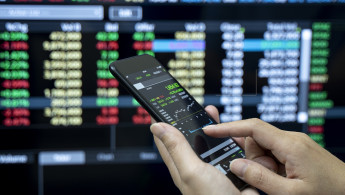Lebanon 'requests FBI help' to shut down black market currency exchange apps: officials
A US Department of Justice spokesperson, however, refused to confirm or deny the report.
"As a policy, the Ministry of Justice does not publicly comment on requests for legal assistance from foreign governments on cases being investigated, including confirming or denying the existence of such requests," the spokesperson told Al-Hurra, a US government funded Arabic news service.
The Lebanese government says that these online platforms have contributed to the national currency’s latest crash, as the black market rate hit 12,000 Lebanese liras to the dollar on Saturday, amid an unprecedented economic crisis which has impoverished mostt of the country.
Lebanese public prosecutor Ghassan Khoury told Al Hurra that platforms like Google Play and Facebook have enabled access to the rogue apps and social media pages in Lebanon.
As Google and Facebook are accountable under US law, the Lebanese request seeks to force these companies to shut down the apps and pages, he said.
Khoury added that the judicial authorities in Lebanon initially contacted local companies to block the applications, including telecom company Orego.
|
|
However, he added that “the [local] companies said they have no ability to do so, and confirmed that this action is limited to American companies. They said we had two options: either to communicate directly with the companies or with the US authorities.”
"But in a case concerning currencies and the exchange rate, we do not know whether the request will be met or not," he said.
Orego’s general manager Imad Kreidieh tweeted that the company has imposed a ban on websites that publish the illegal exchange rate, but is unable to block applications and pages on Google Play and Facebook.
The Lebanese lira hit an all-time low on the black market in early March, and there is a huge discrepancy between the black market rate and the official rate, which has been around 1500 liras to the dollar since 1997.
Lebanese President Michel Aoun ordered the central bank governor on March 2 to open an investigation into currency trading, while protests erupted against government inaction as the country falls deeper into poverty.
Aoun added that traders should be prosecuted if they were responsible for the currency’s decline.
During a meeting this week over the currency crash, Lebanese caretaker Prime Minister Hassan Diab said "although these platforms do not actually reflect the exchange rate, they have become a reference for cashiers as well as for traders in various types of goods."
Khoury accused the apps and social media pages of adding to Lebanon's economic woes.
"The request [to the US authorities] was made for several reasons, including manipulating the exchange rate of the Lebanese pound, undermining confidence in the public finances of the Lebanese state, and corrupting the supply and demand base through fraud and speculation," he told Al-Hurra, adding that the relevant website addresses had been provided to the FBI.
The Lebanese parliament on Friday approved a $246 million loan from the World Bank that would provide cash assistance for more than 160,000 families in the small country, which has been hit by an unprecedented economic crisis exacerbated by the coronavirus pandemic.
Follow us on Facebook, Twitter and Instagram to stay connected





 Follow the Middle East's top stories in English at The New Arab on Google News
Follow the Middle East's top stories in English at The New Arab on Google News
![The UAE is widely suspected of arming the RSF militia [Getty]](/sites/default/files/styles/image_330x185/public/2024-11/GettyImages-472529908.jpg?h=69f2b9d0&itok=Yauw3YTG)
![Netanyahu furiously denounced the ICC [Getty]](/sites/default/files/styles/image_330x185/public/2024-11/GettyImages-2169352575.jpg?h=199d8c1f&itok=-vRiruf5)
![Both Hamas and the Palestinian Authority welcomed the ICC arrest warrants [Getty]](/sites/default/files/styles/image_330x185/public/2024-11/GettyImages-2178351173.jpg?h=199d8c1f&itok=TV858iVg)